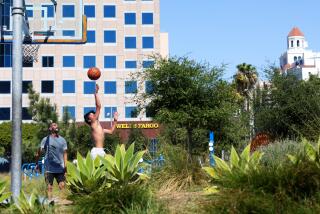The Herald Examiner: Requiem for a Fighter : Media: A former columnist recalls a newspaper that was a fearless competitor, where as many battles were fought inside as out.
- Share via
First, let’s strip away a few myths about the Herald Examiner. It was not killed by the Hearst Corp. in any intentional way. Afternoon papers became a drug on the market nationwide in the era of the freeway commuter and the evening TV news. It became vastly more cost-effective to advertise only in the one largest paper than in two papers in a city. Fixed costs at newspapers were irreducibly large. Economics, numbers on a computer, told the tale of the Herald, not malign individuals.
By any reasonable standard, the Hearst family kept the paper alive far, far longer than was cost-effective. Cosmo, Avon, TV and radio stations within the Hearst empire subsidized the Herald for far longer than would have been permitted within any public company. The Hearsts were charitable donors to the Herald and to Los Angeles, not the vampires some are now claiming.
Nor was the Herald a merry, lively, one-for-all and all-for-one club of altruistic, non-materialistic saint-scribblers. Far, far from it. For as long as I knew it, the Herald was rife with intrigues, cabals, factions, all conspiring against each other, seeking more space on the sun deck of the Titanic. One of the greatest editors of the century, Jim Bellows, was endlessly struggling with empire builders in non-editorial departments to the point that it became a major drain on his prodigious abilities. Bellows’ two superb successors, Mary Ann Dolan and Stan Cloud, were forced to waste precious time and energy managing turf wars within the paper. The talent that might possibly have kept the Herald going a few more years instead went down the rathole of battles over petty titles and responsibilities.
Even at lower levels, the Herald was tortured by attacks at various levels by different factions of writers, business people and other staffers. I was myself the victim of some of these attacks. They hurt and they had no productive point that I could ever see.
But that still leaves plenty of good to talk about. For one thing, the Herald, though small and weak, was fearless. I wrote more than 1,000 columns for the paper. Never, at any time, did any editor attempt to restrain me because my target was a powerful person or company or organization. Bellows, who hired me, had flown against the Imperial Japanese Air Force, and he was not at all afraid of department store managers or politicians. Neither was Dolan or Cloud. They might have hesitated about issues of taste or newsworthiness. They may have had opinions about what mattered to the Herald reader, but they were not afraid of anyone. That matters.
The Herald had a sense of humor. In its headlines, in its cartoons, in its Page 2 in its early days, the Herald genuinely made readers smile. The people who wrote the Herald understood that in a world where there is an incurable contagious disease, legions of homeless, 10 gang killings per week and human beings selling their children for dope, readers have also got to have a chance to smile. They understood that news is not just man bites dog, but that man often is a dog. In its last years, this sense of humor often became tinged with rage, but it still set a standard of sorts.
The Herald had a sense of humility. There was a wonderful feeling when one picked up the paper, or walked through the newsroom, or got a paycheck from the Herald that the people who ran it and worked with it knew they were not the center of the universe. We always knew we were on borrowed time. We always knew we would have to be moving on some day soon. We knew the facts of life were stacked against us. It all gave us the feeling of being small that takes away a lot of the burdens of life--when one read it and when one worked for it.
Goodby, Herald Examiner. Goodby to the little band of warring brothers and sisters, to the small moments of triumph and tragedy. They say that only the foreknowledge of death gives life its highest moments. Now the moment that redeems everything has come for the Herald. Good-by, Her-Ex, we’ll all meet you somewhere down the road.


